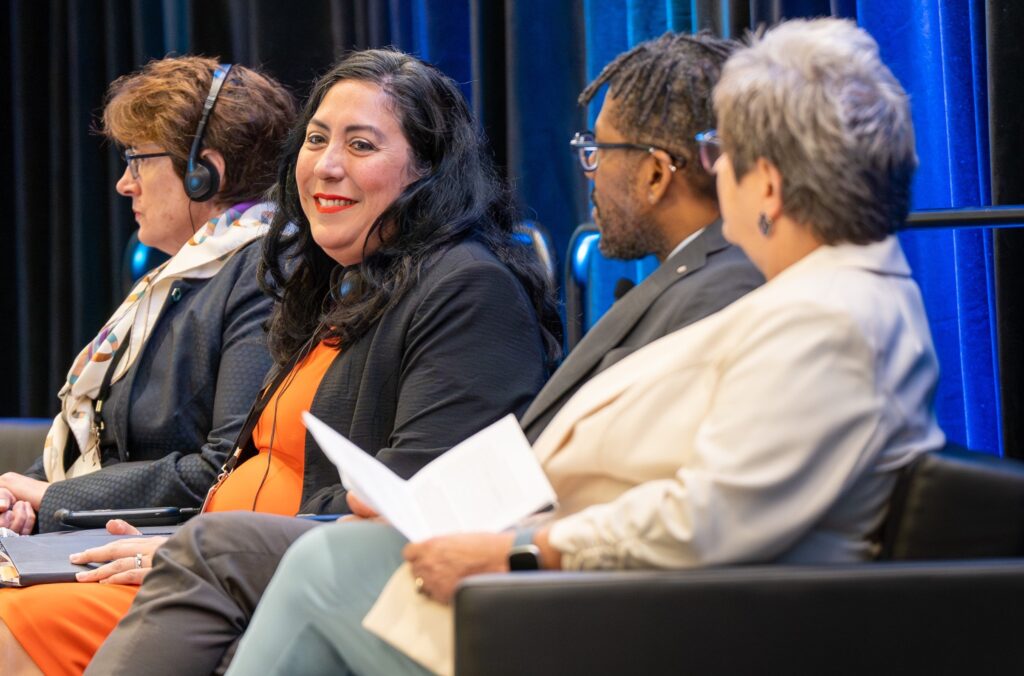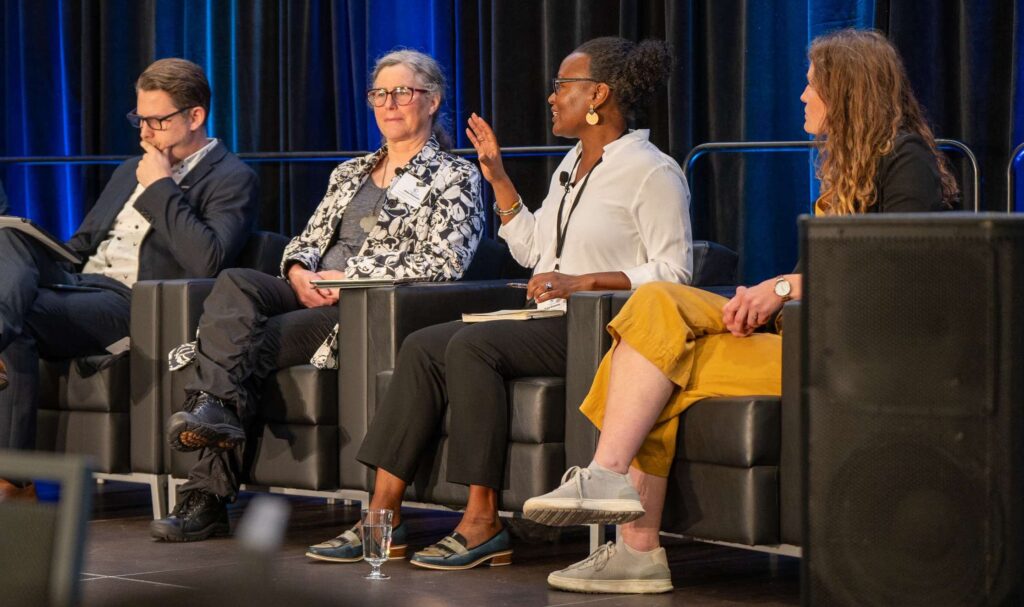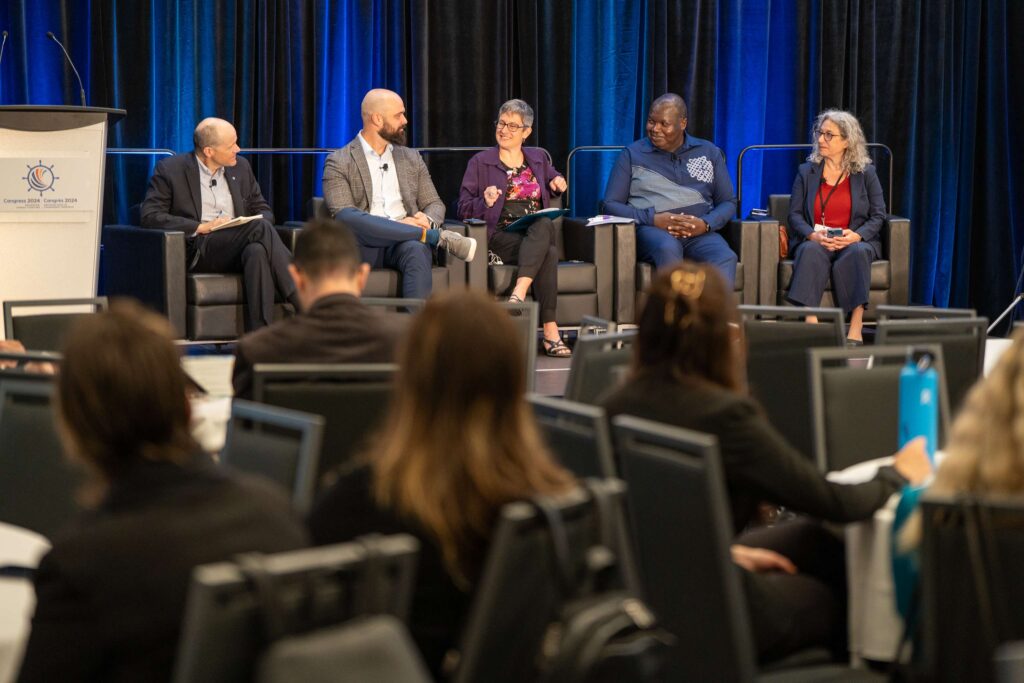Canada’s annual co-operatives and mutuals congress was hosted in Nova Scotia this year, at the Halifax Convention Centre, from 11-13 June. It was cohosted by the Nova Scotia Co-operative Council (NSCC) – which is celebrating its 75th anniversary in 2024 – and apex body Co-operatives and Mutuals Canada, under the theme ‘Navigating Change Together’
Known for being the birthplace of the Antigonish Movement, Nova Scotia played a key role in promoting co-operative solutions beyond its territory. Two of the key figures behind the movement were cousins James J. Tompkins and Moses Michael Coady, whose work is depicted in a new book by Canadian journalist Alec Bruce.
The Cooperators: The People Behind the Rebirth of a Nova Scotia Movement 1949-2024, traces the history of the co-operative movement in the province, which dates back to a co-op store in Stellarton, founded in 1861.
Tompkins and Coady, who were Catholic priests, shared a belief in the power of knowledge and co-operation.
“People can and will control their own stores, their own processing plants, their credit unions by creating their own agencies of service, they will save money. And that is something, but they will also save themselves. And that is everything,” Coady wrote in his pamphlet, Knowledge for the People, published in 1921.

In 1927, Coady testified before a Canadian government commission, calling for the cultivation of critical thinking, scientific methods of planning and production, and co-operative entrepreneurship among ordinary people. This led to the establishment of an Extension Department in St Francis Xavier University (St. F.X.) in Antigonish. Led by Coady, the department provided adult education to the people of the province.
Throughout their lives, the duo were involved in setting up co-ops and credit unions to enable farmers, fishermen and lumbermen to “get their fair share of the national income”.
Their legacy continued after their death and the co-operative movement continues to exist in Nova Scotia, where its co-operatives council represents over 200 co-ops.
Describing his book, Alec Bruce told Congress delegates that Nova Scotian co-ops are “rooted in a history that is, above all, bold, creative and self-determined with eyes trained on the future”.
“History does repeat itself if you learn its lessons well, as Nova Scotia’s co-operatives have. I believe some history is worth repeating,” he said.
Yet, he warned that “not enough people outside the co-operative sector are really understanding [their] enormous power” or the fact that co-ops are a “workable business model.”
“Getting that message out is crucial,” he said.
The sector’s ability to adapt to meet the needs of a changing economy was one of the main themes at the congress, with Johanne Charbonneau, vice-president of the Mouvement Desjardins saying the financial co-op has been adapting to the needs of its members for 120 years.
She explained how within days of the Covid-19 lockdown, Desjardins was offering postponements and rate reductions to members, way ahead of everyone else in the sector. It also helped business members adapt to new requirements. She argued that to continue offering services to members and clients, co-ops must concentrate on what really counts and draw strongly on their co-operative nature.
In the US, the pandemic also led to the general public acknowledging the importance of essential workers, with workers also understanding their self-worth, explained Esteban Kelly, chair of NCBA-Clusa and executive director of the US Federation of Worker Co-operatives (USFWC).

According to Kelly, some people are discovering co-ops on their own or by getting involved in unions or setting up workers’ co-ops. He thinks co-ops should engage with other movements that are campaigning on issues their members care about.
Having a purpose also gives co-ops an advantage, said Gaby Polanco Sorto, vice president and head of Purpose and Sustainability at Gore Mutual Insurance Company, which in 2018 came close to demutualisation.
“It was important for them to define the purpose, demonstrate and communicate it,” said Sorto.
A recent survey revealed the mutual’s consumers valued trust and equated purpose with trust. Purpose is also important for employees, with research suggesting that 91% of employees are looking to work with companies with purpose.
Gore Mutual Insurance is looking to support smaller mutuals to help them cope with new regulatory changes and challenges. “It’s something other companies would not do,” said Sorto.
For Agnès Dupriez, leader in socio-economy engagement practices at the Mouvement Desjardins, the strength of co-operation lies in collectivity.
She said that a federation of credit unions, Desjardins is a system based on inter co-operation. She explained that Desjardins works closely with the Quebec Council for Cooperation and Mutuality (Conseil québécois de la coopération et de la mutualité – CQCM) to support co-ops in other sectors while staying relevant and responding to their members’ needs.
In another session, the Congress explored what co-ops need to do to attract employees and members of different backgrounds.
Chanel Grenaway, a gender and racial equity facilitator at Chanel Grenaway & Associates Inc, told co-ops it is important to recognise who isn’t included and invite those people in, giving them the power when working with them. She warned that while diversity and representation are important, businesses should also consider what inclusion feels like.

“Sometimes we are inviting people in, but if we are not valuing their experience or give them no power, then the changes we want to see in structural systems are not going to happen. So inclusion first, diversity will follow. Inclusion first, equity will follow,” she said.
She added that co-ops are in a good position, compared to the private sector. “You have these values and principles, keep on revisiting those values and ask yourselves ‘How am I embedding the values of equity, the values of solidarity? What does that mean?’ Dive deeper into figuring that out,” she said.
She warned that businesses that are not prioritising DEI run reputational and growth risks.
Zanna Ekeroth, associate facilitator, equity & inclusion at Sunflower Facilitation & Counselling Co-op, agreed that co-ops need to ensure they are creating safe spaces for people to take part and actively contribute, speak up, raise concerns, where they feel they can learn, grow and fail.
“That has to come accompanied with structural changes, with creating career pathways for people who might not feel so confident to advocate,” she said. “Having someone in the leadership position pass on skills and advocate for them, is monumental to somebody’s career progress,” she added.
She also warned co-ops not to become complacent and assume that the mere existence of values and principles will ensure they are inclusive.
“It’s not so much about what we do, but how we do them. As co-ops we are looking to have a positive impact in the community, but sometimes we may forget to look internally at our own team,” she said, encouraging co-ops to work internally, focusing on collective learning and the redistribution of power.
Reba Plummer, Co-CEO of Urbane Cyclist, shared her co-op’s work on increasing diversity on the board by adding two board advisor positions for BIPOC members. She explained that while their co-op had been founded by a diverse group, over time it started looking “like another bro shop”. Initially in an advisory role, the new members now have the power to move and vote as well.
Asked what could be done to foster DEI in a co-op, Nick Beynon, CEO of CPHR Nova Scotia, said leaning into HR analytics around productivity can help get directors on board with measures aimed at improving DEI. Communication is also important, he explained, and has the power to make people understand everyone is welcome.
Co-ops can leverage innovation to build a just and equitable world. However, the lack of awareness remains a challenge. Andrea Nemtin, chief executive at Social Innovation Canada explained that in a lot of circles where people are trying to create positive change in the world they don’t know the co-op model exists and has such a strong track record, even though “the co-op and mutual sector can be a driver for transformational change”.
She added that sometimes innovations fail because they do not use the actors who are going to use the products, meaning that “people are rushing to solutions without really understanding the problem”.
George Ombado executive director/CEO at the African Confederation of Cooperative Savings and Credit Associations (ACCOSCA), thinks co-ops can use new ideas to create systemic changes, exposing people to different ways of doing things – but acknowledged that this comes with challenges. He explained how extreme poverty can prevent some African communities from considering how to improve practices to lower their climate impact. Using clay, for example, degrades the land but people use it to build homes cheaply. An alternative would be to plant trees and use branches that fall to support their buildings.
ACCOSCA is trying to raise awareness about sustainable alternatives by working in partnership with the Desjardins Group. Together they developed an African Climate Action Plan to better promote the preservation and conservation of the environment, increase their resilience and adaptation to climate change, and promote the transition to a green and circular economy.
Co-ops also have an opportunity to innovate, thinks Martin Boucher, Faculty Member at Johnson Shoyama Graduate School of Public Policy, University of Saskatchewan, and president of Community Energy Canada. He argued that while there is resistance to energy transition if folks are participating and have ownership, they are more likely to get on board and become allies. He warned about the lack of diversity within the renewable energy sector, adding that co-ops’ bylaws need to be flexible to encourage people from different backgrounds to join.

In the USA the NCBA-Clusa is working to identify historically underserved communities and help them figure out and assess the tools they have to make changes in their communities.
President and CEO, Doug O’Brien, argued that co-ops have the advantage of being trusted by their members and their communities, which enables them to get feedback quicker and drive innovation faster. However, he added that some co-ops need to think about how to innovate some governance structures for things to move more quickly, some of this can be dealt with via technology some by changing processes.
O’Brien thinks apex organisations can also play a role in driving innovation by connecting co-ops from different sectors as external partners. And they can also serve as an example in governance by being deliberate about ensuring inclusion.
“We want to serve as an example for the co-op community,” he said, adding that “inclusion needs to be deliberate and over time things can change”.
ACCOSCA is working with the Co-operative Development Foundation of Canada to ensure women within African co-ops are promoted, can sit at the table, have their views respected and their contributions is adding value.
Nemtin pointed out that many governance barriers are attitudinal rather than regulatory, and argued that too many diversity strategies focus on “throwing people together”, disregarding that different people will have different levels of experience and discrimination, which might mean some will need more support to feel fully included.
The Congress also featured CMC’s Awards for 2024 which recognise the outstanding contribution to the sector of individuals and organisations.
The winners were Cory Munden (Co-operator of the Year Award), Étienne Desfossés (Young Co-operator of the Year Award), Newfoundland-Labrador (Small Co-operative of the Year Award), The Fogo Island Co-operative Society (Large Co-operative of the Year Award), Collective Interchange (Justice, Equity, Diversity and Inclusion) Initiative of the Year Award), Retournzy Coop (MC Environmental Initiative of the Year Award) and Géoparc de Percé (CMC Environmental Initiative of the Year Award).